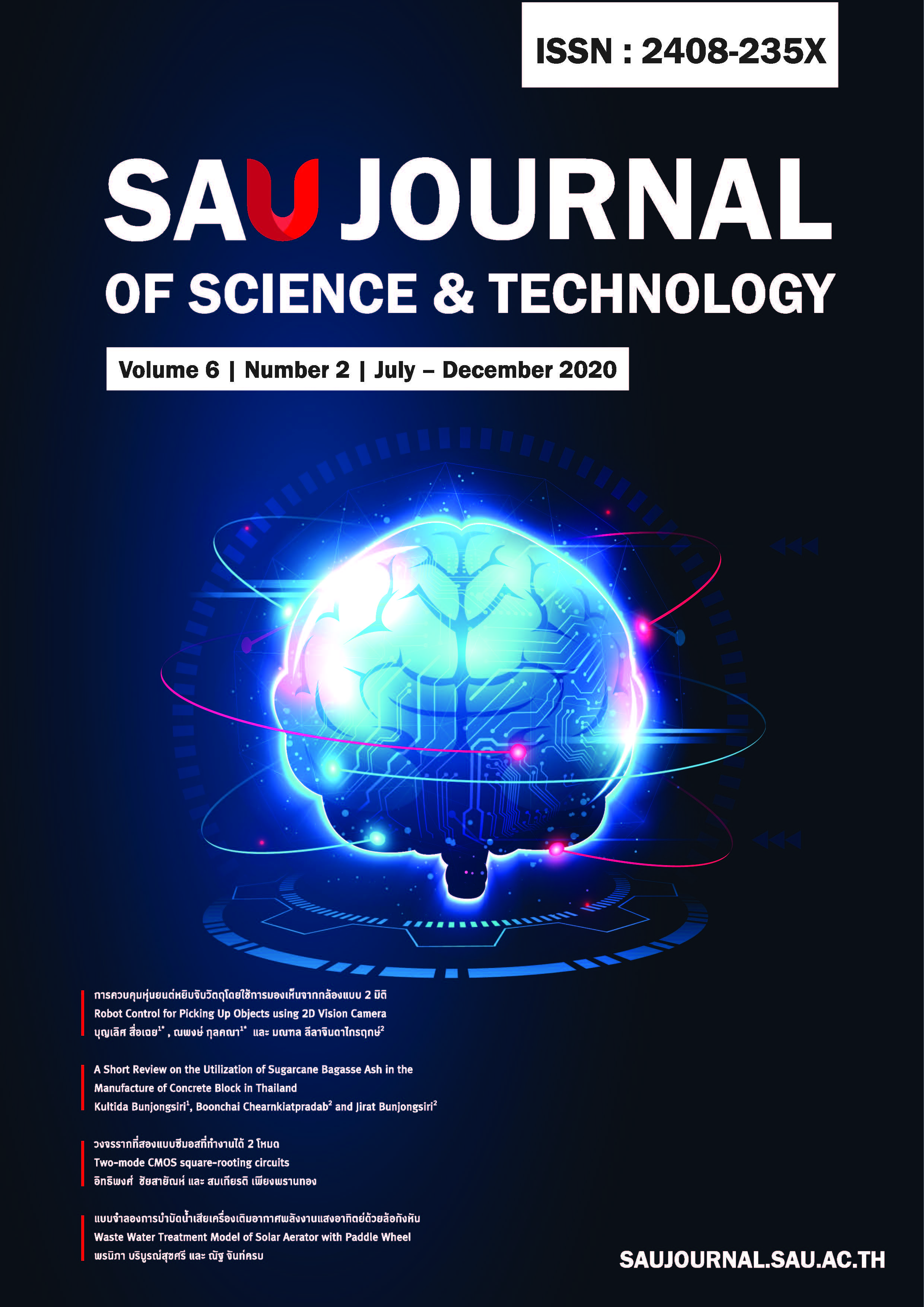Waste Water Treatment Model of Solar Aerator with Paddle Wheel
Main Article Content
Abstract
The research of this study to presents the experiment of the efficiency of a solar- aerator with paddle wheel. The operation principle of a 270-watt solar-powered oxygen filler, which receives solar energy and converts into electrical energy of 18 volts. Then, transfers to the brushless motor controller unit which is responsible for controlling the electricity supplied for the motor, between the solar panel and brushless motor controller unit, and there is an energy meter to measure the electric power, electric charge and electric voltage to analyze system operations. The system is brought to the machine to fill the air in waste water which are stored in a simulated pond of 9.6 cubic meters and collecting treated waste water to measure the level of BOD with continuously for 49 days. The results of analysis found that the BOD value was decreased in exponential characteristics with a decay rate equal to 0.078 in accordance with the equation model: BOD = BOD(0)e-0.078t . The result of the performance analysis from the BOD treatment of a set of solar oxygenators, the electrical energy from the sun is 3.38 kilowatt within 10 hours per day. The initial BOD value at 65 milligrams per liter. It took 15 days for treatment and the BOD value decreases at level 20 milligrams per liter which can support the load of waste water to 41,297 milligrams per day.
Article Details
References
[2] Hudnell, K., Green, D., Vien, R., Butler, S.,Rahe G., Bruce A. R. & Bleth, J. (2010). Improving wastewater mixing and oxygenation efficiency with solar-powered circulation, Clean Technologies and Environmental Policy. 13, pages 731–742 University of North Carolina, Chapel Hill.
[3] Kamal Sarma, A. Rahman and A. Dey. (2018). Impact of solar operated aerator on dissolved oxygen and fish groeth. J. Exp. Zool. India Vol. 21, No. 2, pp. 1041-1046, 2018.
[4] Busch RL, Tucker CS, Steeby JA, Reames JE. An evaluation of three paddle wheel aerators used for emergency aeration of channel catfish ponds. Aquacultural Engineering. 1984; 3:59-69.
[5] Ahmad T, Boyd CE. Design and performance of paddle wheel aerators. Aquacultural Engineering. 1988; 7- (39-62).
[6] Boyd CE, Ahmad TLa-fa, Z. Evaluation of plastic pipe, paddle wheel aerators, Aquacultural Engineering. 1988; 7:63-72.
[7] Moore JM, Boyd C.E. Design of small paddle wheel aerators. Aquacultural Engineering. 1992; 11:55-69.
[8] Fast AW, Tan EC, Stevens DF, Olson JC, Qin J, Barclay DK. Paddlewheel aerator oxygen transfer efficiencies at three Salinities. Aquacultural Engineering. 1991; 19:99-103.
[9] Peterson & Walker (2002). Effect of speed on Taiwanese paddlewheel aeration. Aquacultural Engineering 26(2):129-147.
[10] Bhuyar LB, Thakre SB, Ingole NW. Design characteristics of curved blade aerator w.r.t. aeration efficiency and overall oxygen transfer coefficient and comparison with cfd modeling. International Journal of Engineering, Science and Technology. 2009; 1(1):1-15.
[11] Roy SM, Moulick S, Mukherjee CM, Mal BC. Effect of rotational speeds of paddle wheel aerator on aeration cost. American Research thoughts. 2015; 2(1):3069-3087.
[12] Omofunmi OE, Adewumi JK, Adisa AF, Alegbeleye SO. Development of a paddle wheel aerator for small and medium fish farmers in Nigeria. IOSR Journal of Mechanical and Civil Engineering. 2016; 13(1):50-56.
[13] Chonmapat Torasa, et,al. (2016). Int. J. Ind. Electronics and Electrical Engineering, ISSN: 2347-6982 Volume-5, Issue-2, Feb.-2017
[14] Igib Prasetyaningsari, Agus Setiawan and Ahmad Agus Setiawan. (2013). Design optimization of solar powered aeration system for fish pond in Sleman Regency, Yogyakarta by HOMER software. Energy Procedia 32: 90 – 98.


